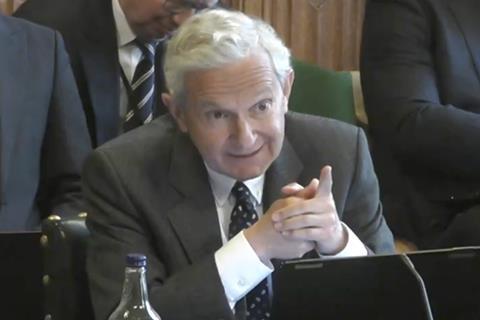In outlining his ‘funnel’ plan of online dispute resolution to MPs, Sir Geoffrey Vos envisages a streamlined system whereby only disputes of high value and complexity would reach court
For too long, according to the master of the rolls, the tail has been wagging the dog. Today, nearly all the attention devoted to civil dispute resolution goes to a tiny proportion of the whole. Even when a claim is filed in the county court – a tiny subset of civil disputes – only one in 20 ever goes before a judge. For the rest, somewhere between 12 and 15 million disputes a year take a toll of distress and distraction.
Appearing before the House of Commons justice committee this week, Sir Geoffrey Vos enthused about his holistic digital solution to this drain on the UK economy. Two years after he first outlined his ‘funnel’ plan of online dispute resolution, he was able to assert its components, and the crucial governance mechanism, are beginning to take shape.
‘Technology provides part, if not the entirety of the solution to many of the problems we face in our justice system,’ the 98th master of the rolls told MPs.
Under gentle prompting by committee chair Bob Neill MP, Vos set out a plan for a three-tier process. Stage one is a universal ‘landing page’ in which anyone with a civil dispute would set out the bare bones of their matter. This would offer basic legal advice and steer them to the most appropriate specialist online forum. Examples might be Online Civil Money Claims, Official Injury Claim or the dispute resolution service for small and medium-sized companies being set up by a private sector joint venture.
‘Only if the second tier fails, then will your data be transmitted via an application programming interface into the justice system,’ Vos said. The presumption is that only a tiny proportion of claims would get that far – hence the ‘funnel’ analogy. In theory the public courts system would deal only with disputes of high value and/or exceptional complexity – plus, inevitably, those with parties emotionally determined to have their day in court regardless of cost.
'Technology provides part, if not the entirety of the solution to many of the problems we face in our justice system'
Sir Geoffrey Vos, master of the rolls
What is groundbreaking about the funnel, Vos said, is its mix of public and private sector services and integration between the two. ‘There needs to be coherence between those that are resolved by the courts and those resolved by other means – it has never been done before.’

Providing that coherence will be one of the jobs of a new Online Procedure Rule Committee, which Vos, among his many other responsibilities, will chair. While its membership, apart from the judicial component, has yet to be decided, Vos dropped hints of how he expected the new committee will work.
The committee is being established under the Judicial Review and Courts Act 2022. It will operate ‘very differently to existing rules committees’, Vos said. For a start, it will generate far fewer rules – the system itself will provide them. Rather than specifying which boxes to complete, the rules will be at a much higher level, for example ‘you must hear the submissions for each party.
‘You won’t need them in the way you need the white book today because the system will tell you what to do.’
However, Vos observed that the committee will also be responsible for technical and data governance – which will involve ‘quite a lot of work’.
Questions from the committee members drew out tacit admissions that much remains to be settled about the details of the system as a whole. The design and functionality of the key component, the ‘landing page’, is still a big unknown. Vos stressed that, like all elements in the system, it would be designed for litigants in person. And questioned on whether its legal advice would be delivered by humans or AI chatbots, the renowned techno-evangelist was in a strikingly cautious mode.
Reminding the MPs that a large proportion of people arriving on the landing page would have little idea of the nature of their often multiple legal issues, he stressed the importance of human help at an early stage. ‘I can envisage having real legal advisers, not AI chatbots, giving advice to people who need it at the earliest possible stage.’ Again, the online rules committee will oversee what is on offer. ‘We must not lose sight of the fact that real people need real help.’
The new lord chancellor is ‘extremely enthusiastic’, about the value of early legal advice, he said – though was unable to offer any suggestion of how it might be paid for.
While much work remains to be done – extending, as Vos suggested, far beyond the end of the current courts reform programme in 2024 – the holistic online system looks set to become reality.




































10 Readers' comments